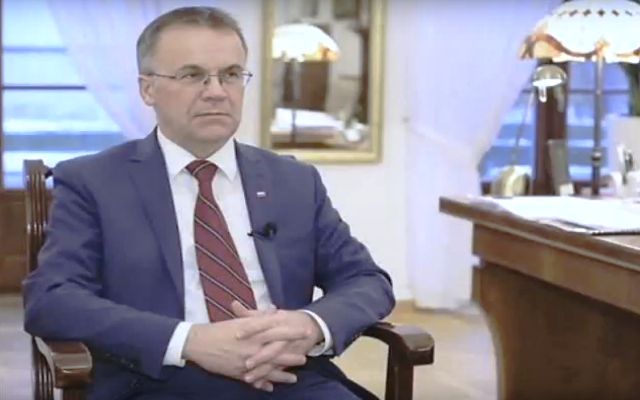Polish Deputy Culture Minister Jaroslaw Sellin wants to open a museum dedicated to “the fate of Poles during World War II.”
By: World Israel News Staff
A Polish minister has lent support for the idea of opening a museum that will focus on the Poles’ “holocaust” during World War II.
Polish Deputy Culture Minister Jaroslaw Sellin on Tuesday backed the call for building a “Polocaust” museum, in comments that may further exacerbate tensions with Israel, Reuters reported.
“I think the story of how the fate of Poles during World War II looked like … deserves to be told and shown in this way [in a museum],” Sellin told Poland’s Radio One, according to translations by Reuters.
“It is enough to read official German documents from these times or Hitler’s book to know that after the Jews, whom he wanted to completely erase from Europe…, the next [target] was generally Slavic people, especially Poles,” he added.
There have been calls in Warsaw to establish museums dedicated to expanding the country’s narrative on the Holocaust.
Marek Kochan, a popular columnist, suggested opening a “Polocaust Museum” in response to international criticism Poland has faced over a law signed last week that criminalizes blaming the Polish nation or state for Holocaust crimes.
“The State of Israel has succeeded in imposing a narrative reducing the victims of the war to the victims of the Holocaust. And yet no death resulting from criminal intentions is better or worse than another,” Kochan wrote in the Polish Rzeczpospolita daily, according to translations from the Buzzfeed news site.
The polish law specifies prison time for those who ‘defame’ Poland by using phrases such as “Polish death camps” when referring to Auschwitz and other Nazi-run death camps located in Poland during World War II.
Princeton University Professor Jan Tomasz Gross, an expert on Polish complicity in the Holocaust, previously stated that Poland’s new stance dissociating itself from the Holocaust is “a step back to the dark ages of anti-Semitism.”
The Polish-born sociologist and historian has stoked controversy in Poland with works that expose dark chapters in a wartime history that Poles are otherwise proud of thanks to a strong resistance by Poles to Nazi Germany.
The latest uproar surrounding Gross began after he asserted in 2015 that Poles killed more Jews than Germans during the war. Though the exact numbers are difficult to measure, Gross said evidence indicates that Poles killed up to 30,000 Germans during the war, at most, while they probably killed 70,000 to 90,000 Jews, but possibly more.




